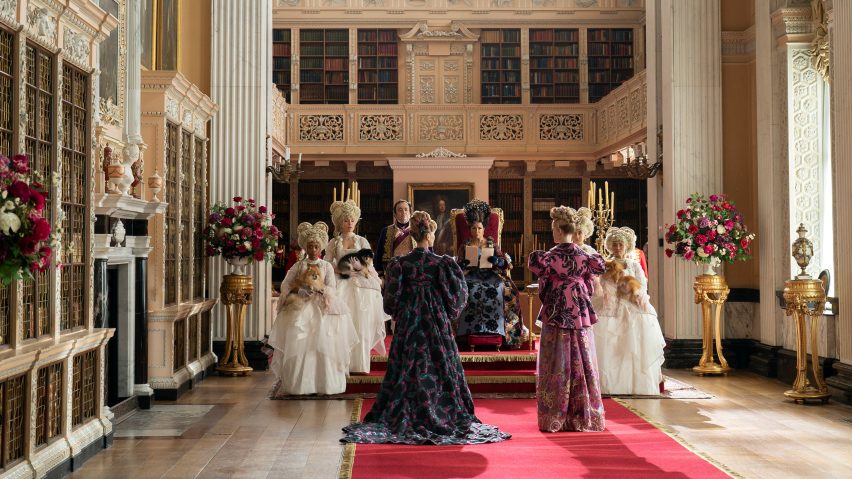Nine kilometres of ribbon were used for one ball alone in series three of Netflix's Regency-era drama Bridgerton, which features decadent set designs that "soaked up materials".
The latest series of Bridgerton follows the solidifying of the stewing romance between characters Colin Bridgerton (played by Luke Newton) and Penelope Featherington (played by Nicola Coughlan), who is simultaneously attempting to conceal her identity as Lady Whistledown, the town's elusive gossip columnist.
Set decorator Natalie Papageorgiadis told Dezeen how she worked with production designer Alison Gartshore to create the drama's many sets, filmed at various UK heritage locations and an undisclosed studio in west London.
"We inherited some really fabulous sets [from seasons one and two, established by Will Hugh-Jones and Gina Cromwell] to embellish," said Papageorgiadis.
"There were a handful of key spaces that we revisited in the story, such as the Bridgerton and Danbury drawing rooms. And some we reworked, and a large number we created from scratch."
One of the sets that was adapted for series three was Penelope's bedroom, which was subtly altered to reflect the character's increased wealth and independence.
"For the character to develop, we need to see a change in Penelope's personal space," explained Papageorgiadis.
Papageorgiadis added more soft furnishings to the character's bed, mounted extra paintings onto the walls and lined the shelves with petite "pretty" objects finished in the pastel hues associated with the Featherington family.
"We wanted to demonstrate that Penelope's been spending the money that she's been making by printing [the] Whistledown [column], but only with smaller items that she could've acquired at a market so as not to arouse any suspicion," said the set decorator.
"She's also becoming more independent as a woman, so her space reflects that. Especially in the new layers of 'feminine' fabrics that have been added in," continued Papageorgiadis.
Colin Bridgerton, who at the start of the series has recently returned from a stint of travel, was also given an updated apartment to illustrate his character's progression.
Maps and journals from regions he visited, including Paris and Marseilles, were used to decorate his home.
"His apartment has a French influence to it," explained Papageorgiadis, who noted its "rich and romantic yet intellectual feel".
The team was inspired by the many antiquities, sculptures and furniture pieces at London's Sir John Soane's Museum, which formed part of the visual research for series three.
"We imagined Colin to have collected various objects on his travels that he was proud of," said Papageorgiadis. "They were on display in cabinets and niches – items that are specific to the regions that he went to."
Papageorgiadis sourced props from antique and other "cheap" markets across the UK and Europe or made objects from scratch to align with the Regency era in which Bridgerton is set.
"When you inevitably can't always find everything you need, our process varies from sculpting objects to furniture that has to be put together," explained the set decorator.
For example, Bridgerton's dedicated drapery team created custom drapes from materials including silk and velvet to ensure that the curtains fit the specific dimensions of their sets.
The team also painted into drapes and furniture to give them an "extra lift" on screen and glazed the paintings.
"We often have to embellish furniture," said Papageorgiadis. "Even in your drapery, you've got to express the characterisation."
Bridgerton's third series includes eight different balls, which the set decorator called the "marked difference" between the first two seasons.
"The balls are far more theatrical this time, and we could really have fun with leaning into the themes of these sets," Papageorgiadis explained, citing the many camera angles that the designers had to negotiate when dressing the sets to achieve continuity between scenes.
"We were dealing with bigger sets, so processing much larger quantities of fabrics and florals," added the set decorator.
"A funny example that I can think of is that we used nine kilometres of ribbon for the full moon ball. And I'm pretty sure that somewhere through the prep of the Queen's ball, southern England would've run out of gold bullion trim!" she said.
"Shortages like these aren't uncommon because these sets can be so big. They soak up a lot of materials."
Papageorgiadis also considered the rise of Regencycore – a style trend influenced by 18th-century decadence, which emerged after Bridgerton first aired on Christmas day in 2020.
"We're not super conscious of it when we're in the thick of dressing and filming," she reflected. "Our design choices are always led by what we interpret from the script and ideas that come through from the story."
"But you do become aware of it when you step into the outside world," Papageorgiadis added.
"I do think it's just a lovely, positive thing. If people watch something and are so moved by it that they feel the desire to have something of that world in their home or at their workplace, then I can only see that as a very positive and affirmative impact."
Previous otherworldly sets created for the screen include Shona Heath and James Price's designs for Yorgos Lanthimos's film Poor Things and Patrice Vermette's elaborate sets made for the movie Dune: Part Two.
The photography is courtesy of Netflix.

